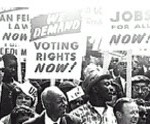Now until Aug. 12, 2011, we have access to the Digital National Security Archive at the below link:
https://www.proquest.com/trials/trialSummary.action?view=subject&trialBean.token=6ZAMBK4DRF0KTY0XJG80
ProQuest, in partnership with The National Security Archive produce the Digital National Security Archive, the most comprehensive collection available of significant primary documents central to U.S. foreign and military policy since 1945. Over 80,000 of the most important, declassified documents – totaling more than 500,000 pages -are included in the database. Many are published now for the first time.
The National Security Archive is a non-profit research institute and library, located at The George Washington University in Washington, D.C., which provides unprecedented public access to declassified government documents obtained through extensive use of the U.S. Freedom of Information Act (FOIA).
DNSA currently contains thirty-six collections:
Afghanistan: The Making of U.S. Policy, 1973-1990
The Berlin Crisis, 1958-1962
China and the United States: From Hostility to Engagement, 1960-1998
Colombia and the United States: Political Violence, Narcotics, and Human Rights, 1948-2010
The Cuban Missile Crisis, 1962
The Cuban Missile Crisis Revisited: An International Collection of Documents, From the Bay of Pigs to the Brink of Nuclear War
Death Squads, Guerrilla War, Covert Operations, and Genocide: Guatemala and the United States, 1954-1999
El Salvador: The Making of U.S. Policy, 1977-1984
El Salvador: War, Peace, and Human Rights, 1980-1994
Iran: The Making of U.S. Policy, 1977-1980
The Iran-Contra Affair: The Making of a Scandal
Iraqgate: Saddam Hussein, U.S. Policy and the Prelude to the Persian Gulf War, 1980-1994
Japan and the United States: Diplomatic, Security, and Economic Relations, 1960-1976
Japan and the United States: Diplomatic, Security, and Economic Relations, Part II, 1977-1992
The Kissinger Telephone Conversations: A Verbatim Record of U.S. Diplomacy, 1969-1977
The Kissinger Transcripts: A Verbatim Record of U.S. Diplomacy, 1969-1977
The National Security Agency: Organization and Operations, 1945-2009
Nicaragua: The Making of U.S. Policy, 1978-1990
Peru: Human Rights, Drugs and Democracy, 1980-2000
The Philippines: U.S. Policy during the Marcos Years, 1965-1986
Presidential Directives on National Security from Harry Truman to William Clinton (Part I)
Presidential Directives on National Security from Harry Truman to George W. Bush (Part II)
South Africa: The Making of U.S. Policy, 1962-1989
The Soviet Estimate: U.S. Analysis of the Soviet Union, 1947-1991
Terrorism and U.S. Policy, 1968-2002
The United States and the Two Koreas from Nixon to Clinton (1969-2000)
U.S. Espionage and Intelligence, 1947-1996
U.S. Intelligence and China: Collection, Analysis, and Covert Action
The U.S. Intelligence Community after 9/11
The U.S. Intelligence Community, 1947-1989
U.S. Intelligence on Weapons of Mass Destruction: From World War II to Iraq
U.S. Military Uses of Space, 1945-1991
U.S. Nuclear History: Nuclear Arms and Politics in the Missile Age, 1955-1968
U.S. Nuclear Non-Proliferation Policy, 1945-1991
U.S. Policy in the Vietnam War, Part I: 1954-1968
U.S. Policy in the Vietnam War, Part II: 1969-1975
DNSA’s newest collection is U.S. Intelligence and China: Collection, Analysis, and Covert Action. Each collection contains a diverse range of policy documents including presidential directives, memos, diplomatic dispatches, meeting notes, independent reports, briefing papers, White House communications, email, confidential letters and other secret material. Contextual and reference supplements are provided for each collection, including general introductory material, a chronology, glossary and bibliography. Content is carefully selected by top scholars in the field.
Documents have been indexed to permit item and page-level searching across more than 20 combinable fields. In its totality, DNSA offers the most powerful research and teaching tool available in the area of U.S. foreign policy, intelligence and security issues during the pivotal period of twentieth-century history.
DNSA also contains the CIA Family Jewels Indexed. Among the most controversial documents ever compiled by the Central Intelligence Agency, the “Family Jewels” represents the CIA’s own view, in 1973, of those domestic activities it had engaged in up to that time that were outside its charter, hence illegal. Totaling 703 pages and consisting of summary reports and supporting documents sent from CIA directorates and divisions to the agency’s chief, the “Family Jewels” contains chilling references to CIA contacts with the Mafia, denials of involvement in assassinations, materials on CIA interrogations, surveillance of journalists and the antiwar movement in the U.S., penetrations of other federal agencies, a break-in at the Chilean embassy, cooperation with local law enforcement authorities, support for White House political activities, responses to the leak of the Pentagon Papers, and much more.
Questions or Feedback? Please ask us at http://libanswers.uah.edu or give us a call at 256-824-6529.



